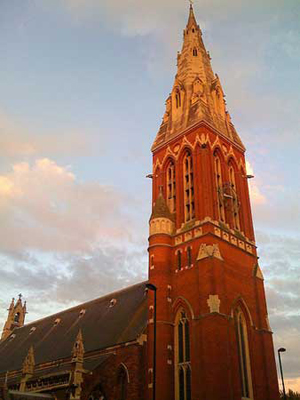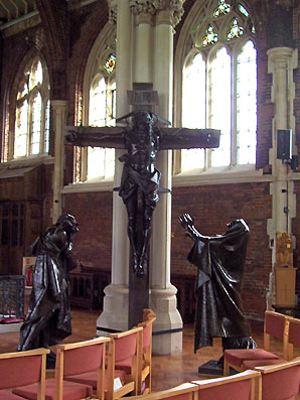| |
 |
 |
 |
| Comment on this report, or find other reports. |
 |
| Our Mystery Worshippers are volunteers who warm church pews for us around the world. If you'd like to become a Mystery Worshipper, start here. |
 |
| Find out how to reproduce this report in your church magazine or website. |
|
|
| 1938: St John
the Divine, Kennington, London |
 |

Photo: victoriapeckham |
 |
Mystery Worshipper:
Deputy Verger.
The church:
St John the Divine,
Kennington, South London.
Denomination:
Church of England, Diocese
of Southwark.
The building:
The poet Sir John Betjeman, who had impeccable taste in churches,
stations and towns, called it "the most magnificent church in
South London." The church is one of the finest examples of Victorian
Gothic in the country, and that's just the outside. Indoors,
the Kelham Rood alone (so called after its original commission
for the great chapel at Kelham Hall in Nottinghamshire) is worth
your fare from wherever in the world you are reading this report.
See the church's website for details of this masterpiece by
the World War I sculptor Charles Jagger, but if you have ever
imagined yourself standing at the foot of the cross with St
John and the Blessed Virgin Mary, this is where you can do it.
(See the photo below.) Also, this church is the only church of which I am aware that
has gargoyles featuring Queen Elizabeth II and Prince Charles.
Bring binoculars – they are quite a way up the tallest spire
in South London (260 feet). Designed by the Victorian architect
George Edmund Street (who built the London law courts on the
Strand) and completed by his son, the church was damaged in
the blitz in 1941 and restored after World War II to the original
drawings. The original interior by the Gothic revivalist George
Frederick Bodley was sadly lost, however.
The church:
The church is connected to two schools, which is quite unusual
– a mixed primary and a school for older girls. It is involved
in the Robes
Project, which provides night shelter for the homeless in
this part of South London. The congregation includes enough
members of diverse African communities to celebrate (on the
Sundays closest to the dates in question) the independence days
of (at least) Ghana, Nigeria and Sierra Leone with fabulous
lunches. After a lengthy interregnum, the new Welsh vicar has
reinstated a cycle of daily eucharistic services in the inclusive
Anglo-Catholic tradition – so it's an amazing mixture of bells
and smells and accents under a Grade One listed roof.
The neighbourhood:
It's an extremely mixed community – a racially diverse, not
exactly posh neighbourhood, but among the clusters of post-war
blocks of council flats there are some quite nice single-family
homes in the parish, with private gardens and garages. It's
a multicultural inner city suburb just off the Brixton Road
with a long history of poverty. There are diverse African, Caribbean
and Portuguese communities in the area. There are no fancy shops
or restaurants at all, but lots of small independent grocers
and the ubiquitous chains of betting shops. However, the Surrey
County Cricket Ground (Kennington Oval) is only a few minutes
walk away, and there are a couple of London Underground stations
nearby – a rare treat south of the river.
The cast:
The president and preacher was the Rt Revd Peter Selby, the
retired bishop of Worcester. The Revd Mark Williams, the new
vicar, and the Revd David Garlick, who had held the fort throughout
the recent interregnum, flanked the bishop on the platform and
preceded him in procession. They were all spectacularly robed
in heavily embroidered chasubles. There were also deacons and
acolytes aplenty.
The date & time:
Holy Saturday, 3 April 2010, 8.00pm (until 11.00pm!).
What was the name of the service?
The Easter Vigil, with Sacraments of Initiation and First Mass
of the Resurrection.
How full was the building?
Half full. I would guess well over 100 souls, counting the congregation,
choir and clergy.
Did anyone welcome you personally?
Two lovely ladies at the back of the church were very friendly
as they handed out the service leaflet and said we could sit
anywhere.
Was your pew comfortable?
Modern linked pale wooden chairs with upholstered seats – well
designed and not uncomfortable during a long service.
How would you describe the pre-service
atmosphere?
People greeted one another. There was a sense of anticipation,
mostly around the confirmation and baptism candidates in the
front rows. There were a few people quietly praying. As the
time for the service to start arrived, things settled down.
The choir had entered and were seated behind the altar. The
congregation had mostly arrived and taken seats. And still there
was a bustling going on around the vestry. The service eventually
started 10 minutes late; I have no idea why.
What were the exact opening words of the
service?
"Brothers and sisters in Christ, this is the night in which
our Lord Jesus passed over from death to life."
What books did the congregation use during the
service?
A printed booklet contained all the liturgy and the hymns for
the service.
What musical instruments were played?
Organ.

Photo: Cnbrb
Did anything distract you?
First, the late start had me looking at my watch and wondering.
Second, an undisciplined toddler nearby got right up my nose.
Fortunately, due to the peripatetic nature of the service (moving
outside for the Easter fire after the initial readings) it was
possible to escape from said toddler, after which I was just
mesmerised by the amazing Kelham Rood.
Was the worship stiff-upper-lip,
happy clappy, or
what?
It was seriously theatrical, all bells and smells and candles,
but it was by no means stiff. There was all the usual high church
stuff: the many long readings, the Easter fire and paschal candle
outside, then two baptisms and six confirmations, then the first
mass of Easter. But it might have been my imagination, or it
might have been a deliberate effort to show that Anglo-Catholic
worship can be inclusive – the readers and cantors were
a real mix of alternating gender and colour. It can't have been
accidental.
Exactly how long was the
sermon?
10 minutes.
On
a scale of 1-10, how good was the preacher?
8 – It was perfectly appropriate; it just didn't blow my
mind. It was genuinely kind and warm and welcoming to the eight
people who were being confirmed or baptised this night, and
it was perfectly pitched. Bishop Selby was brilliant. They will
never forget him. It brought tears to my eyes, actually. There
was nothing wrong with it. There was nothing else he could say.
In a nutshell, what was the sermon
about?
It was about thinking in new ways. It really was directed (and
rightly so) to the eight men and women (all adults) who were
being baptised and confirmed, but with a reminder to the larger
congregation that we were renewing our baptismal vows this night
and that we also had to keep thinking in new ways. We might
think, for example, that we are more significant than others
due to our qualifications, salaries, titles or other symbols
of worldly achievement, or that we are part of a community and
strangers are outside of it. But not so! Jesus, after all, was
a refugee with no qualifications. From tonight on, we are to
think of ourselves differently, as dead to worldly ways.
Which part of the service was like being in
heaven?
The obvious joy of the newly baptised and confirmed, and the
love that surrounded them. That was a glimpse of heaven. And
the music – it was worthy of a cathedral. Lovely choir, wonderful
organ. And the lovely flowers entwined in the wrought-iron cage
that surrounds the baptismal font. It was glorious.
And which part was like being in... er... the other place?
The awkwardness at the late start was irritating. More awkwardness
at being stuck outside in the cold for no apparent reason when
the paschal candle led the procession back indoors.
What happened when you
hung around after the service looking lost?
No lostness. The grand finale was really unexpected. There was
a table laden with food and drink, and we all helped ourselves
in abundance. It was very friendly. But there was more. We all
followed the new vicar out into the churchyard (remember, this
is South London, surrounded by council estates) where he set
off fireworks and we all screamed "Happy Easter" into
the suburban night sky.
How would you describe
the after-service coffee?
Decent wine in proper glasses, but store-bought food: muffins
and cheese sticks, etc. Real home-made food would have been
nicer, such as I expect is produced for the various national
days throughout the year. But did I bring any? I did not, so
I have no right to complain.
How would you feel about making this church your regular (where 10 = ecstatic, 0 = terminal)?
9 – There is not much not to like, if you like South London,
which I do. Not sure why I am not spitting out a 10 there.
Did the service make you feel glad to be a
Christian?
Yes, it was very moving.
What one thing will you remember about all this in seven days' time?
Fireworks! |
|
|
 |
 |
 |
| We rely on voluntary donations to stay online. If you're a regular visitor to Ship of Fools, please consider supporting us. |
 |
 |
 |
| The Mystery Pilgrim |
 |
| One of our most seasoned reporters makes the Camino pilgrimage to Santiago de Compostela in Spain. Read here. |
 |
 |
 |
| London churches |
 |
| Read reports from 70 London churches, visited by a small army of Mystery Worshippers on one single Sunday. Read here. |
| |
|
|
|
|


